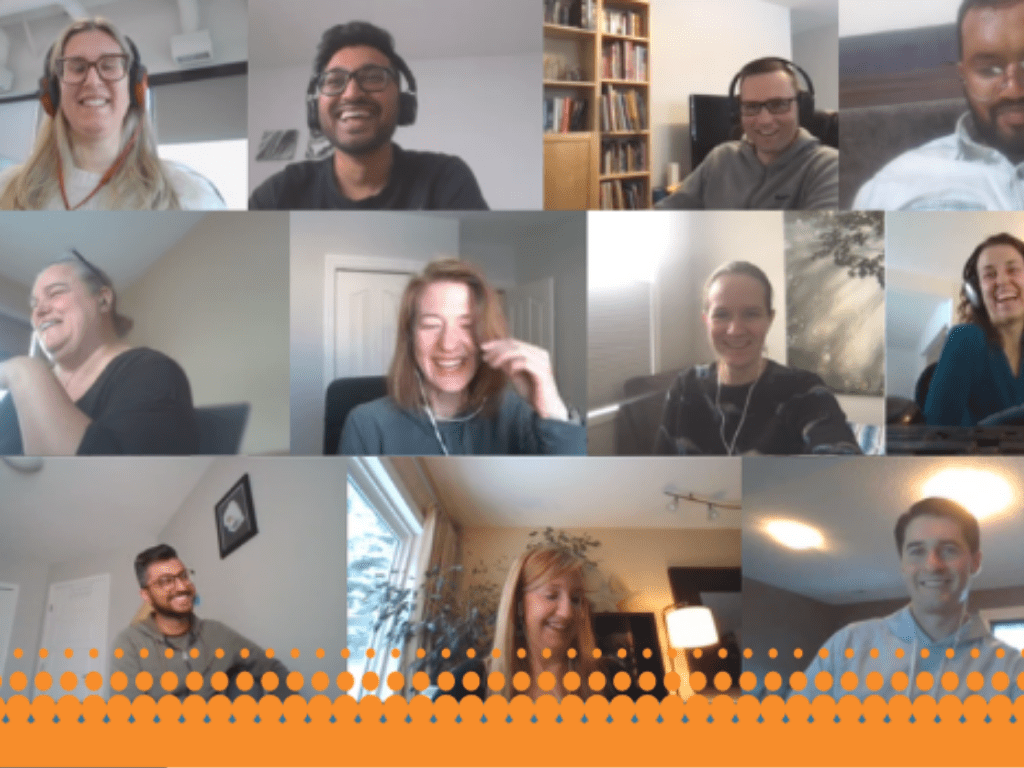The Importance of Mental Fitness At Work
At Vovia, our team comes first as we know a happy team leads to long-lasting client partnerships and a successful business.
Our team has been absolutely amazing this past year from seamlessly shifting to a remote working model, to always making the time for those personal connections with their colleagues. This has helped our team support one another, collaborate, and maintain a strong connected culture while working remotely.

We appreciated that as interesting the past year has been as marketers, it has been exhausting as individuals. It was an exciting year as there were so many changes in consumer habits across all the industries we support, however it also was exhausting worrying about our health, our families, the future, and adapting to the constant changes both in our work and personal lives.
Recently, we asked Steve Brierley from Optimum Talent to come in and do a workshop with us on mental fitness. The purpose was to give us all some time to be vulnerable together and to reflect on the past year, how it affected us, and how to ensure we have the tools to continue to be resilient for the changes to come.
Whether you are an employer trying to figure out what to do next or a team member worried about returning to work, Steve has some helpful wisdom for all of us.
Steve, what are some of the trends around how people are feeling that companies should be considering?
Some of the key trends that need to be top of mind are mental health, the need for structure and flexibility, and the need for leadership visibility.
Mental Health
Companies need to be willing and trained to talk about it. Here are some stats that support this:
- 40% of individuals say companies are not asking about mental health
- 40% of individuals want to talk about it
- 53% of people feel more emotionally exhausted
Another major trend is the amount of anxiety some individuals are feeling around coming back to work or changes to work policies. And others still have anxiety that continues to build as they work from home. Some stats to be mindful of:
- 75% of people feel more socially isolated
- 67% of people are experiencing higher stress
- 57% of people are experiencing greater anxiety
Companies must have an open-door policy with regard to mental health. Leaders need to connect with their teams on both work but also any personal pressures that could be impacting them i.e. child care. If policies change, leaders should be checking in with their team to understand if these changes are creating any added pressure or challenges for their team members so they can provide flexibility and support where needed.
Balance Structure with Flexibility
Companies are exploring many options on how they adapt as more vaccines are administered. Regardless of the decision made, it needs to have structure but also flexibility at the individual level!
- 39% of employees said they would look for a new employer if they didn’t have a flexible work environment.
Be empathic on what is driving anxiety for team members struggling with any policy changes. Some are concerned about their new routine with families and any changes that stem from coming back. Some are still very fearful of COVID so companies need to respect this and ensure they are approachable and have options that support these needs i.e. gradual transition etc. that helps team members adapt to any changes taking place.
For companies considering hybrid models i.e. 3 days in and 2 days home, ensure you are working with employees on what returning to work looks like i.e. which day they prefer. You could even develop a company charter or guidelines around the purpose of in-office vs. WFH to ensure everyone has clarity understands the “why”. Some of the companies I am working with plan to have the team and leaders in together on the same days to leverage spontaneous innovation and training support.
I have noticed some are leaving decision making at the team level or even individual with leader level which I caution this could lead to some serious issues and companies need to think about how they can support leaders if a conflict arises.
This structure needs to also address the role of meetings. Again some companies are even including meeting guidelines in their charter. Questions to consider:
- Should we shorten them based on what we have learned around video burnout?
- How do you ensure there is free time on the days people come in so they have time to connect and are not blocked in meetings all day?
- Considering having no meeting days or afternoon on Friday etc.
- Think about those sharing a meeting room vs those calling in and how best to address gaps i.e. side conversations, too many people talking at once, pre-meeting or post-meeting discussions etc.
Visibility
Leaders need to be conscious and intentional on being visible. Leading from your office (whether you are in the office or at home) is not visible! Being visible is being face-to-face with the person either in person or through technology. It is making time for the team.
A great example of how leaders have done this remotely is having live working meetings where individuals can work on the same call muted but then just unmute to ask a question if they run into issue on anything.
It needs to be genuine, intentional, and consistent. Visibility builds transparency, trust and approachability.
What is mental fitness and why is it important?
Mental fitness is being intentional about doing something that positively impacts your mental health.
Mental Health is “a state of well-being where every individual realizes his or her own potential, can cope with the normal stresses of life, work productively, and is able to make a positive contribution to his or her community” (World Health Organization).
Achieving this state of well-being depends on our ability to balance external demands with our internal supports. Mental fitness continually changes and isn’t an on/off switch but more of a continuum. At our best, we are thriving and generally doing well. When our internal supports are depleted, we do our best to cope but may end up in crisis if external demands overwhelm our internal supports.
How can companies use this with their teams?
Talking about it and changing the focus from mental health to mental fitness is an important first step. Additionally, people need to really commit to it to make a difference.
A great way to embed this into your culture is to encourage teams to do mental fitness at the beginning of meetings as a check-in with one another or anonymously if preferred.
Help individuals understand this is a lifelong pursuit that needs to be intentional. Just as with your physical health, in order to improve your mental health you need to work at it and what that looks like varies from person to person. Ultimately you should be doing something you enjoy doing.
Any tips on how individuals can best conserve energy (external demands)?
- Stepping back and assessing what they typically do in their work or personal environment and identify the areas that are draining
- Once you identify these areas try to minimize them
- For example, you could be on technology around the clock and realize you might need to set time limits on your day to stop looking at work requests etc. Let your team and family know so they can support you.
Any tips on how individuals can best refuel their energy (internal supports)?
- Stepping back and assessing what gives you energy and joy
- It could be: meditation, going for a walk or getting outdoor experiences, socializing with others etc.
- Ensure you allow time daily to schedule this into your plan and make it a habit
- I had a client that shared with me how while working from home they created a false commute just to make time for themselves to decompress and wind down their workday during quarantine
With restrictions lifting and the world evolving to what I would call a new normal, any advice on what companies should be thinking about?
- Providing that balance of framework that allows for individual flexibility and ensuring the leadership is visible and approachable to have these conversations
- The new normal has to be about constant discussion and check ins on mental fitness
- I see this as a reset for employers and employees – what can you to do now that you didn’t do before that will make your work environment and work life balance better?
- Foster a culture of acceptance and recognizing people will feel very differently on what the best approach is and talk about it
Any advice for individuals feeling anxiety about these potential changes?
You need to decide who is appropriate to talk to and share your feelings with a confidant or relevant leader or human resources team. If you struggle to have those conversations reach out to your family assistance program to get support on how best to approach the conversation.
Any additional resources you recommend folks read if they are interested in learning more about this?
I feel this site is incredibly helpful: https://www.workplacestrategiesformentalhealth.com/resources/guarding-minds-at-work
Steve, I can’t thank you enough for the time and the training you did with our team. I know we use the mental fitness continuum check in our team meetings just so we all know as a company how everyone is feeling/doing. We also created mental fitness groups made up of 4 team members per group. These teams hold each other accountable on our goals around what we are aiming to minimize, that is draining our energy or what we need to do to replenish our energy and how well we are maintaining those goals. It has been a wonderful experience that benefitted each of us personally but has also brought our team even closer together (we didn’t know it was possible as we’re pretty close).
Steve has been supporting our organization for 3 years now and we have nothing but amazing things to say about his expertise, approach, and coaching. If you are looking for any advice or workshops you can find Steve on LinkedIn or you can reach out to Steve and his team at Optimum Talent.
